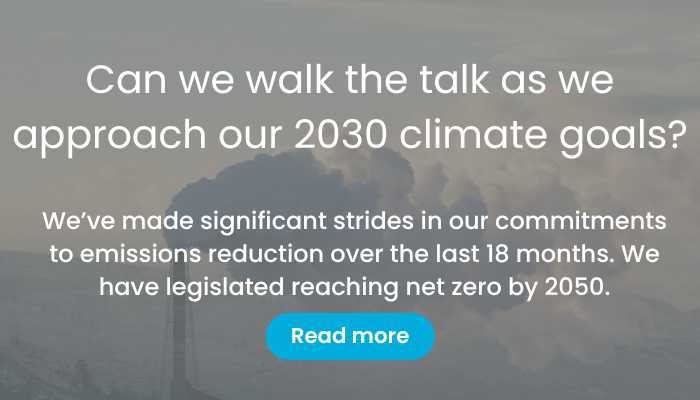Climate Change and Sustainability in Australia
Access deep knowledge and actionable insights on climate and sustainability risks and opportunities in Australia. Our independent, economics-focused view helps you make strategic decisions and propel your business toward a green future.

Act on climate and sustainability risks and opportunities with independent, economics-driven insight.
Oxford Economics Australia on Climate and Sustainability
Get the latest insights, straight to your inbox.
Green Economy Transition
The transition to a green economy is uncertain. There will be winners and losers, challenges and opportunities. How sectors and companies are affected by the shift towards a net zero future depends on many factors including changes to weather patterns, policy and regulation, credit and capital market access and consumer choices.
By building a robust understanding of how sectors will be affected by a wide range of scenarios, and how corporate decisions can influence the path followed, organisations can equip themselves to minimise the myriad of risks for themselves and their value chain associated with the green economy transition.

Post
Australia’s Safeguard Mechanism to complement CBAM
In October 2023, the CBAM entered its first transitional phase, requiring EU importers to start reporting on their emissions. The CBAM will come into full force in 2026, when importers will be required to purchase and surrender CBAM certificates.
Find Out More
Post
Can we walk the talk as we approach our 2030 climate goals?
As the world heats up, so does the urgency to assess our collective progress against the goal of limiting global temperature increases to 2℃ as set out in the Paris Agreement.
Find Out MoreMore Insights | Our Capabilities
Climate-related Risk Management and Disclosure
Businesses need to analyse and understand all the climate-related risks they are exposed to, both physical and transitional. However, with the complexity involved, many companies struggle to gather all the required data and interpret their meaning.
There are currently a variety of bodies working towards standardising impact reporting and disclosure frameworks around the world. The various initiatives can appear complicated to the unfamiliar—TCFD, TNFD, ESRS and IFRS to name a few, but they’re all aligned in terms of the intention and the requirements: measure not just a company’s direct risks but also indirect risks, such as supply chain disruption, changing client preferences, network effects or energy prices.
More Insights | Our Capabilities
Customer Stories

Case Study | Australian Energy Market Operator
Oxford Economics Australia and AEMO’s 2022-23 Energy Outlook Collaboration
Project background The Australian Energy Market Operator (AEMO) engaged Oxford Economics Australia (OEA) to develop economic and demographic scenario forecasts for their 2022-23 energy outlook reports. AEMO, responsible for Australia-wide planning and forecasting publications, required these forecasts as inputs into their modelling processes. The scenarios, outlined in AEMO’s Inputs, Assumptions and Scenarios Report, were developed…
Find Out More
Case Study | QBE LMI
The Annual Housing Outlook 2022 – the Green Edition
The objective The objective of this work was to reinforce QBE LMI’s position by providing an outlook of housing market performance and stimulate informed discussion about environmental sustainability within the housing market and a state by state performance analysis of housing market prices and rents. The solution The project was approached collaboratively with the QBE…
Find Out More
Case Study | Australian Energy Market Operator
Review and validation of AEMO’s cost of capital assumptions for renewable energy investments
Project background The Australian Energy Market Operator (AEMO) engaged Oxford Economics Australia (OEA) to review their cost of capital assumptions for long-term investments in the National Electricity Market (NEM). The review aimed to assess the impact of asset-specific and market risks on the cost of capital. The cost of capital assumptions are key to developing…
Find Out MoreContact us today

Kristian Kolding
Head of Consulting, OE Australia
+61 (4) 1040 9070

Kristian Kolding
Head of Consulting, OE Australia
Sydney, Australia
Kristian leads Oxford Economics Australia’s Consulting team, working with public and private sector leaders to help them prepare for the future by applying relevant economic theory and forecasts to inform effective policy and business strategy development.

Ruchira Ray
Lead Economist, Climate & Sustainability

Ruchira Ray
Lead Economist, Climate & Sustainability
Sydney, Australia
Ruchira joined Oxford Economics Austalia in 2019, in macroeconomic consulting. Ruchira has worked on several buy side and sell side Due Diligence projects for assets spanning energy, transport, and real-estate. Additionally, Ruchira leads our climate change consulting team in Australasia.Ruchira also has experience in the energy sector, working on several gas and electricity outlook reports for the Australian Energy Market Operator (AEMO), leading the development of industrial sector demand forecasts including regularly interviewing energy intensive industrial users of gas and electricity; producing retail gas price forecasts and conducting scenario setting consultation with industry.Ruchira is also well versed with operating our Global Economic Model (GEM) to produce scenario forecasts.

Emily Dabbs
Head of Macroeconomics Consulting, Oxford Economics
+61 2 8458 4202

Emily Dabbs
Head of Macroeconomics Consulting, Oxford Economics
Sydney, Australia
Emily leads Oxford Economics Australia’s Macro Consulting team. She has over 10 years of economic analysis and consulting experience, focusing on macroeconomic forecast and analysis. Emily regularly provides strategy support and briefings, and presentations to clients and key stakeholders to support a broader understand of the economic environment and the impact on their business.

